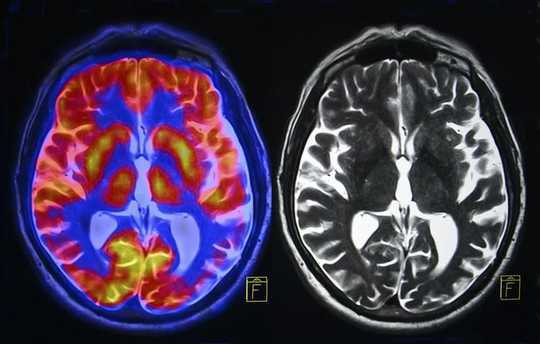 Stress can make your life considerably less colourful. Semnic Barbara Jacquelyn
Stress can make your life considerably less colourful. Semnic Barbara Jacquelyn
A bit of stress is a normal part of our daily lives, which can even be good for us. Overcoming stressful events can make us more resilient. But when the stress is severe or chronic – for example caused by the breakdown of a marriage or partnership, death in the family or bullying – it needs to be dealt with immediately.
That’s because repeated stress can have a huge impact on our brain, putting us at risk of a number of physical and psychological problems.
Repeated stress is a major trigger for persistent inflammation in the body. Chronic inflammation can lead to a range of health problems, including diabetes and heart disease. The brain is normally protected from circulating molecules by a blood-brain barrier. But under repeated stress, this barrier becomes leaky and circulating inflammatory proteins can get into the brain.
The brain’s hippocampus is a critical brain region for learning and memory, and is particularly vulnerable to such insults. Studies in humans have shown that inflammation can adversely affect brain systems linked to motivation and mental agility.
Get The Latest By Email
There is also evidence of chronic stress effects on hormones in the brain, including cortisol and corticotropin releasing factor (CRF). High, prolonged levels of cortisol have been associated with mood disorders as well as shrinkage of the hippocampus. It can also cause many physical problems, including irregular menstrual cycles.
Mood, cognition and behaviour
It is well established that chronic stress can lead to depression, which is a leading cause of disability worldwide. It is also a recurrent condition – people who have experienced depression are at risk for future bouts of depression, particularly under stress.
There are many reasons for this, and they can be linked to changes in the brain. The reduced hippocampus that a persistent exposure to stress hormones and ongoing inflammation can cause is more commonly seen in depressed patients than in healthy people.
Chronic stress ultimately also changes the chemicals in the brain which modulate cognition and mood, including serotonin. Serotonin is important for mood regulation and wellbeing. In fact, selective serotonin reuptake inhibitors (SSRIs) are used to restore the functional activity of serotonin in the brain in people with depression.
Sleep and circadian rhythm disruption is a common feature in many psychiatric disorders, including depression and anxiety. Stress hormones, such as cortisol, play a key modulatory role in sleep. Elevated cortisol levels can therefore interfere with our sleep. The restoration of sleep patterns and circadian rhythms may therefore provide a treatment approach for these conditions.
Depression can have huge consequences. Our own work has demonstrated that depression impairs cognition in both non-emotional domains, such as planning and problem-solving, and emotional and social areas, such as creating attentional bias to negative information.
 Burning out? Be careful. Andrey_Popov
Burning out? Be careful. Andrey_Popov
In addition to depression and anxiety, chronic stress and its impact at work can lead to burnout symptoms, which are also linked to increased frequency of cognitive failures in daily life. As individuals are required to take on increased workload at work or school, it may lead to reduced feelings of achievement and increased susceptibility to anxiety, creating a vicious cycle.
Stress can also interfere with our balance between rational thinking and emotions. For example, the stressful news about the global spread of the novel Coronavirus has caused people to hoard hand sanitisers, tissues and toilet paper. Shops are becoming empty of these supplies, despite reassurance by the government that there is plenty of stock available.
This is because stress may force the brain to switch to a “habit system”. Under stress, brain areas such as the putamen, a round structure at the base of the forebrain, show greater activation. Such activation has been associated with hoarding behaviour. In addition, in stressful situations, the ventromedial prefrontal cortex, which plays a role in emotional cognition – such as evaluation of social affiliations and learning about fear – may enhance irrational fears. Eventually, these fears essentially override the brain’s usual ability for cold, rational decision-making.
Overcoming stress
So what should you do if you are suffering from chronic stress? Luckily there are ways to tackle it. The UK Government Foresight Project on Mental Capital and Wellbeing has recommended evidenced-based ways to mental wellbeing.
We know, for example, that exercise has established benefits against chronic stress. Exercise tackles inflammation by leading to an anti-inflammatory response. In addition, exercise increases neurogenesis – the production of new brain cells – in important areas, such as the hippocampus. It also improves your mood, your cognition and your physical health.
Another key way to beat stress involves connecting with people around you, such as family, friends and neighbours. When you are under stress, relaxing and interacting with friends and family will distract you and help reduce the feelings of stress.
Learning may be a less obvious method. Education leads to a cognitive reserve – a stockpile of thinking abilities – which provides some protection when we have negative life events. In fact, we know that people are less likely to suffer from depression and problems in cognition if they have better cognitive reserve.
Other methods include mindfulness, allowing us to take notice and be curious of the world around us and spend time in the moment. Giving is another – volunteering or donating to a charity activates the reward system in your brain and promotes positive feelings about life.
Importantly, when you experience chronic stress, do not wait and let things get the better of you. Early detection and early effective treatment is the key to a good outcome and good wellbeing. Remember to act in a holistic manner to improve your mood, your thinking and your physical health.
And you don’t have to wait until you are overwhelmed with stress. Ultimately, it is important that we learn from an early age to keep our brain fit throughout our whole life course.![]()
About The Author
Barbara Jacquelyn Sahakian, Professor of Clinical Neuropsychology, University of Cambridge; Christelle Langley, Postdoctoral Research Associate, Cognitive Neuroscience, University of Cambridge, and Muzaffer Kaser, Clinical Lecturer, University of Cambridge
This article is republished from The Conversation under a Creative Commons license. Read the original article.
books_health







